#Ferran Fages
Text
"Volx" [Tàlveg Arbori (2020)] Por Pachi Tapiz. JazzX5 #495 [Minipodcast de jazz]
“Volx” [Tàlveg Arbori (2020)] Por Pachi Tapiz. JazzX5 #495 [Minipodcast de jazz]
“Volx”
Tàlveg Arbori (2020, Bandcamp)
Marcel·lí Bayer, Ferran Fages, Oriol Roca. El tema es obra de Tàlveg.
¿Sabías que?
Arbori fue la primera grabación de larga duración de Tàlveg. No obstante, el trío ya había publicado un EP con anterioridad. Posteriormente publicó un nuevo LP, y otros tres EP, dos de ellos titulados Live Series I y II una pura declaración de intenciones.
© Pachi Tapiz,…
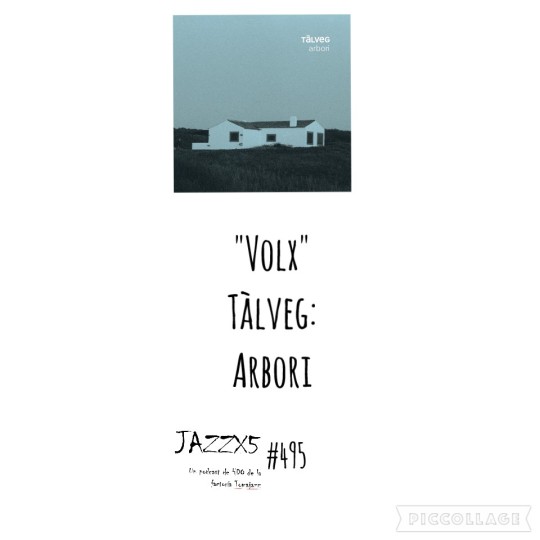
View On WordPress
#Bandcamp#Ferran Fages#JazzX5#Marcel·lí Bayer#Minipodcast#Oriol Roca#Pachi Tapiz#podcast de jazz#Tàlveg
0 notes
Audio
Nad Spiro - L’Important: Film Music With No Film - in the Radiophonic mode
L’IMPORTANT> A soundtrack in search of a film
Sonic agent Nad Spiro explores unfrequented AudioZones in the outer peripheries of electronica and stretches the sound reach of her guitar with a perverted use of this instrument.
Under this anonymous alias, Rosa Arruti's spectral presence in
experimental music has adopted finally the form of a solo project as sole habitant of a world of complex electronic textures and sound fictions.
In this fictional soundtrack, Nad Spiro evokes a solitary space drift aboard a missing spacecraft: L’Important. Side B is a collection of lost low-fi songs by cosmonaut Nadia Spier, consisting of some suggestive tracks by way of transcriptions of secret tapes.
Limited edition of 100 CDs + artZine (gsg 05) - GaSaG © 2022
Cassette by Crystal Mine (Crystal Mine #100)
Project produced and recorded by Rosa Arruti
aka Nad Spiro > synths, sequences, guitar, voice
L’IMPORTANT C R E W >
Nadia Spier - lost cosmonaut /sounds & guitars
Zane Speer - short story and drawings
Joan Fontcuberta - inside poster & photographs
Marc Valls - graphic design
Ferran Fages - mastering (V20 studio)
Ken Hollings - translation supervision deck (short-story)
L’IMPORTANT (1984) : short story by Zane Speer aka Carlos Merseburger (Ediciones Kalahari, 1996)
...... .. Thanks: Gaia - cover : © ESA - D. Ducross
3 notes
·
View notes
Text
Dust, Volume 7, Number 7

What are Grandbrothers doing to that piano?
Greetings from under the heat dome, where shipments of vinyl are melting mid-journey and even the coolest of cool jazz sounds a little wilted by the time it reaches your ear. We are sitting in the shade. We are drinking lemonade and iced tea. We are looking for the window fans and lugging old air condition units up from the basement. We are, perhaps, headed to the community pool for the first time since our kids were young, though also, perhaps not. In any case, we are still getting through piles of recorded music, even in this heat, and finding some gems. Here are dispatches from the furthest reaches of Japanese psych, European free jazz, self-released indie folk, Irish lockdown angst, Moroccan raging punk and lots of other stuff. Contributors included Mason Jones, Jennifer Kelly, Bill Meyer, Tim Clarke, Bryon Hayes, Jonathan Shaw, Arthur Krumins and Chris Liberato. Stay cool.
Yuko Araki — End of Trilogy (Room40)
End Of Trilogy by Yuko Araki
These 16 tracks whoosh past in just 35 minutes, with most of them clocking in around two minutes in length. Many don't reach a conclusion: they simply end abruptly, and the next one starts. Araki manipulates electronics to create whirling, sizzling atmospheres of confusion, sometimes fast-moving burbles of percussion and synths, at other moments pushing distorted hissing and confrontational tones to the front. The aptly-named "Dazed" begins with a cinematic feel, then its galactic drones give way to static and metallic scrapes. "Positron in Bloom" is like a chorus of machine voices shouting angry curses into space, and "Dreaming Insects" sounds as if the titular creatures are being pulled downstream in fast-moving rapids. Oscillating between menacing and humorous, End of Trilogy's bite-sized pieces of surrealist electronics are never boring.
Mason Jones
Alexander Biggs — Hit or Miss (Native Tongue Music Publishing)
Hit or Miss by Alexander Biggs
Alexander Biggs blunts sharp, stinging lyrics in the sweetest sort of strummy indie-pop, working very much in the Elliott Smith style of sincerity edged with lacerating irony. “All I Can Do Is Hate You” finds a queasy intersection between soft pop and tamped down rage, Biggs murmuring phrases like “I want you to fuck me til I can’t say your name,” but melodically, over cascades of acoustic guitar. “Madeline” is the pick of the litter here, a dawdling jangle of guitar framing knife-sharp lyrics about romantic disillusionment. “Miserable,” sports a bit of lap steel for emotional resonance, demonstrating once more, if you had any doubt, that very sad songs can make you feel better somehow. Biggs is good at both the softness and the sting, and for guy-with-a-guitar albums, that’s what you need.
Jennifer Kelly
Christer Bothén 3 — Omen (Bocian)
Omen by Christer Bothén 3
Dusted’s collective consciousness has spent a lot of time considering Blank Forms’ recent publication, Organic Music Societies, which considers Don and Moki Cherry’s convergence of artistic and familial efforts during the 1960s and 1970s, as well as the two archival recordings by Don and associates, which shed light upon his Scandinavian musical activities. All three are worth your attention, but their liveliness is shaded by the awareness that almost every hopeful soul involved is no longer with us. But Christer Bothén, who introduced Don to the donso ngoni and subsequently played in his bands for many years, is not only among the living, he’s got breath to spare. This trio recording doesn’t delve into the African sounds that bonded Bothén and Don. Rather, the Swede’s bass clarinet draws bold and emphatically punctuated melodic lines, driven by a steaming rhythm section that takes its cues from Ornette Coleman’s mid-1960s trio recordings. This music may not sound new, but it’s full of lived-in knowledge and vigor.
Bill Meyer
Briars of North America — Supermoon (Brassland)
Supermoon by Briars of North America
New York-based trio Briars of North America take patient, painterly, occasionally cosmic approach to folk music. With “Sala,” Supermoon sounds like a backwoods Sigur Ros. A falsetto voice intoning a made-up language arcs elegantly over sustained waves of electric piano. Soon after, the album touches down into more grounded guitar-and-cello territory on pieces such as “Island” and “Chirping Birds,” which bring to mind Nick Drake, albeit less contrary or withdrawn. At the album’s midway point, the listener is carried into the aether with the eerie sustained brass and wordless vocals of the eight-minute “The Albatross of Infinite Regress.” A similar space is explored at the album’s end with the 12-minute “Sleepy Not Sleepy,” as strings and warbling synthesizer tones intermingle with the return of the made-up language. Though the band’s more conventional vocal-led songs, such as “Spring Moon,” are decent enough, Briars of North America touch upon something expansive and ineffable when they explore their more experimental side.
Tim Clarke
Bryan Away — Canyons to Sawdust (self-released)
youtube
Chicago-based actor, composer and multi-instrumentalist Elliot Korte releases music under the moniker Bryan Away. His new album, Canyons to Sawdust, begins with what feels like two introductions. “Well Alright Then” is a Grizzly Bear-style scene-setter for wordless voices, strings and woodwinds, while “Within Reach” sounds like a tentative cover of Radiohead’s “Pyramid Song” that runs out of steam before it had the chance to build momentum. The first full song, single “The Lake,” gets the album up and running in earnest with its melancholy piano and string arrangement spiked with pizzicato plucks and bright acoustic guitar figures. Half Waif lends her vocal talents to “Dreams and Circumstance,” another highlight featuring some lovely interplay between guitar arpeggios and drum machine. One pitfall of exploring romantic musical territory is the risk of sounding a tad saccharine, and the weakest links in the album, companion tracks “Scenes From a Marriage” and “Scenes From a Wedding,” have the kind of performative tone you’d expect to find on the soundtrack of a mainstream romantic comedy. Elsewhere, though, Korte’s judgment is sound, and there’s plenty of elegant music to be found. Fans of Sufjan Stevens will no doubt find a lot to like, and it’ll be interesting to see where Bryan Away ventures next.
Tim Clarke
Jonas Cambien Trio — Nature Hath Painted Painted The Body (Clean Feed)
Nature Hath Painted the Body by Jonas Cambien Trio
On its third album, the Jonas Cambien Trio has attained such confidence that it’s willing to mess with its signature sound. The Oslo-based combo’s fundamental approach is to stuff the expressive energy and textural adventure of free jazz into compositions that are by turns intricate and rhythmically insistent but always pithy. This time, the Belgian-born pianist Cambien also plays soprano sax and organ. The former, stirred into André Roligheten’s bundle of reed instruments, brings airy respite from the music’s tight structures; the latter, dubbed into locked formation with the piano and jostled by Andreas Wildhagen’s restlessly perambulating percussion, expands the music’s tonal colors. The tunes themselves have grown more catchy, so much so that their twists and turns only become apparent with time and repeat listening.
Bill Meyer
Ferran Fages / Lluïsa Espigolé — From Grey To Blue (Inexhaustible Editions)
From Grey To Blue by Ferran Fages
When discussion turns to a pianist’s touch, it’s tempting to think mainly of what they do with their fingers. But it must be said that Lluïsa Espigolé exhibits some next-level footwork on this realization of Ferran Fages’ From Grey To Blue. Fages is a multi-instrumentalist who functions equally persuasively within the realms of electroacoustic improvisation and heavy jazz-rock, but for this piece, which was devised specifically for Espigolé, he uses written music and an instrument he doesn’t play, the piano, to engage with resonance and melody. The three-part composition advances with extreme deliberation, often one note at a time, turning the tune into a ghostly presence and foregrounding the details of the decay of each sound. This music is so sparse that the shift to chords in the third section feels dramatically dense after a half hour of single sounds and corresponding silences. The elements of this music have been sculpted with such exquisite control that one wonders if Catalonia has looked into insuring Espigolé’s feet; her way with the piano’s pedals is a cultural resource.
Bill Meyer
Grandbrothers — All the Unknown (City Slang)
All the Unknown by Grandbrothers
The duo known as Grandbrothers hooks a grand piano up to an array of electronic interfaces, deriving not just the clear, gorgeous notes you expect, but also a variety of percussive and sustained sounds from the classic keyboard. In this third album from the two—that’s pianist Erol Sarp and electronic engineer Lukas Vogel—construct intricate, joyful collages, working clarion melodies into sharp, pointillist backgrounds. The obvious reference is Hauscka, who also works with prepared piano and electronics, but rather than his moody beauties, these compositions pulse with rave-y, trance-y exhilaration. If you ever wondered what it would sound like if the Fuck Buttons decided to cover Steve Reich, well, maybe like this, precise and complex and shimmering, but also huge and triumphant. Good stuff.
Jennifer Kelly
id m theft able — Well I Fell in Love with the Eye at the Bottom of the Well (Pogus Productions)
Well I Fell in Love With the Eye at the Bottom of the Well by id m theft able
Al Margolis’ Pogus Productions imprint has cast its gaze toward the strange happenings in Maine, netting a mutant form of electroacoustic wizardry in the process. Scott Spear is the one-man maelstrom known as id m theft able, an incredibly prolific and confounding presence in the American northeast. He draws influence from musique concrète and sound poetry, but adds a whimsical spirit, a tinker’s ingenuity and the comedic timing of a master prankster to his compositions. Sometimes this leads to the bemusement of his audience, but he tempers any surface madness with an endless curiosity and a playful sense of the meaning of the word music. Well I Fell in Love with the Eye at the Bottom of the Well ostensibly came to be via Spear’s desire to create a doo-wop tune. Only Spear himself knows whether this is fact or fiction, because it is clear from the opening moments of “Shun, Unshun and Shun” that this disc is full of sonic non-sequiturs, amplified clatter and delightful mouth happenings that are as far removed from doo-wop as possible. The madness is frequently tempered with beautiful moments: a broken music box serenades a flock of chirping birds in the middle of a mall, Spear hypnotically chants at a landscape of crickets, flutes pipe along to the patter of rain on a window. As one gets deeper into the record, the sound poetry aspects become more and more pronounced, such as on “The Curve of the Earth” and the closing piece, “Purple Rain.” Those seeking a humor-filled gateway drug into that somewhat perilous corner of the sonic spectrum would be wise to pop an ear in the direction of this frenetic assemblage of sound.
Bryon Hayes
Mia Joy — Spirit Tamer (Fire Talk)
Spirit Tamer by Mia Joy
Mia Joy turns the temperature way down on gauzy Spirit Tamer, constructing translucent castles in the air out of musical elements that you can see and hear right through. The artist, known in real life as Mia Rocha, opens with a brief statement of intent in a one-minute title track that wraps wisps of vocal melody with indistinct but lovely sustained tones. The whole track feels like looking at clouds. Other cuts are more substantial, with muted rock band instruments like acoustic and electric guitars and drum machines, but even indie-leaning “Freak” and "Ye Old Man,” are quiet epiphanies. Rocha sounds like she is singing to herself softly, inwardly, without any thought of an audience, but also so close that it tickles the hair in your ears. Rocha closes with a cover of Arthur Russell’s “Our Last Night Together,” letting rich swells of piano stand in for cello, but tracing the subtle, undulating lines of his melody in an airy register, an octave or two higher. Like Russell, Rocha sets up an interesting interplay between deep introversion and presentation for the public eye; she’s not doing it for us, but we’re listening anyway.
Jennifer Kelly
Know//Suffer — The Great Dying (Silent Pendulum Records)
The Great Dying by KNOW//SUFFER
It’s not inaccurate to describe The Great Dying as a hardcore record. You’ll hear all the burly breakdowns; buzzing, overdriven guitars; and grimly declaimed vocals that characterize the genre, which since the mid-1990s has moved ever closer to metal. But Know//Suffer have consistently infused their music with sonic elements associated with other genres of heavy music. Most of the El Paso band’s 2019 EP bashed and crashed along with grindcore’s psychotic, sprinting energy. The Great Dying is a longer record, and it slows down the proceedings considerably. There are flirtations with sludge, and even with noise rock’s ambivalent gestures toward melody: imagine Tad throwing down with a mostly-sober version of Eyehategod, and you’re more than halfway there. As ever, Toast Williams emotes forcefully, giving word to a very contemporary version existential dread. But there’s frequently a political edge to the lyrics on this new record. On “Thumbnail,” he sings, “I swallow what must be hidden / Hoping assimilation makes me whole / The whole that everyone thinks I am / Smiling under this mask knowing / I’m not hiding my face in public.” “Assimilation” is a loaded word, especially on the Southern Border, and it’s no joke walking around in public as a proud black man anywhere in Texas. Wearing a mask as you walk into Target? P.O.C. stand a chance of getting shot. Know//Suffer still sound really pissed off, but the objects of their anger seem increasing outside of their tortured psyches, located in the lifeworld’s social planes of struggle. That gives their grim music an even harder charge, and makes Williams’s performances of rage even more powerful.
Jonathan Shaw
Heimito Künst — Heimito Künst (Dissipatio)
HEIMITO KÜNST by Heimito Künst
The debut album from Italian experimental instrumentalist Heimito Künst, recorded over several years in his home studio, uses an array of electronic and primitive instrumentation to create an overall woozy, dark atmosphere. From groaning, atonal slabs of organ, like a detuned church service, to murmuring field recordings and scrapings, these seven tracks are less like songs and more like unsettling journeys through sound. Pieces like "Talking to Ulises" blend quiet Farfisa tones and a wordlessly singing voice in the distance. Ironically, although the final track is titled "Smoldering Life", it's unexpectedly brighter, with major-key synth notes over the cloudy sound of a drum being bashed to pieces before ending with an almost gentle, summertime feel.
Mason Jones
Jeanne Lee — Conspiracy (moved-by-sound)
Conspiracy by JEANNE LEE
Lots of 1960s and 1970s jazz reissues offer beautiful music, but few redefine how liberating improvised music can be. Conspiracy, originally recorded in 1974 by Lee on vocals with an ensemble that includes Sam Rivers and Gunter Hampel, falls into the latter category without feeling forced. It combines sound poetry, the conversation of spontaneity, and grooves that don’t stay on repetition but still get ingrained into your brain somehow. Best digested in a contemplative sitting, the album demands you give your whole attention to the direction of the music and words mixed with extended vocal techniques. The sound shifts from a full-on medley of flutes, drums, bass and horns with voice, to more minimal experiments. The recording is clean and uncluttered, even at its busiest. A lushly enjoyable listen.
Arthur Krumins
Sarah Neufeld — Detritus (Paper Bag)
Detritus by Sarah Neufeld
Sarah Neufeld’s third solo album grew out of a collaboration with the Toronto choreographer Peggy Baker, begun before the pandemic but dealing anyway with loss, intimacy and grief. The violinist and composer works, as a consequence with a strong sense of movement, underlining rhythms with repeated, slashing motifs in her own instrument and pounding drums (that’s Jeremy Gara, who, like Neufeld, plays in Arcade Fire). You can imagine movement to nearly all these songs. “With Love and Blindness” rushes forward in a wild swirl of strings, given weight by the buzz of low-toned synthesizer and airiness in the layer of denatured vocals; you see whirling, bending, graceful gestures. “The Top” proceeds in quicker, more playful patterns; agile kicks and jumps and shimmies are implied in its contours. “Tumble Down the Undecided” has a raw, passionate undertow, its play of octave-separated notes frantic and agitated and the drumming, when it comes, fairly gallops. This latter track is perhaps the most enveloping, the notes caroming wildly in all directions, in the thick of the struggle but full of joy.
Jennifer Kelly
Aaron Novik — Grounded (Astral Editions)
Grounded by Aaron Novik
Aaron Novik is a clarinetist with an extensive background in jazz, klezmer, rock and in-between stuff, but you wouldn’t know any of that from listening to this tape. Its ten numbered instrumentals sound more derived from the sound worlds of 1970s PBS documentaries, Residents records of similar vintage, and Pop Corn’s fluke hit, “Pop Corn.” Recorded during the spring of 2020, when Novik’s new neighborhood, Queens, became NYC’s COVID central, it manifests coping strategy that many people learned well last year; when the outside world is fucked and scary, retreat to a room and then head down a rabbit hole. In this case, that meant sampling Novik’s clarinets and arranging them into perky, bobbing instrumentals. The sounds themselves aren’t processed, but it turns out that when recontextualized, long, blown tones and keypad clatter sound a lot like synths and mechanized beats. There’s a hint of subconscious longing in this music. While it was made in a time and place when many people didn’t leave the house, it sounds like just the thing for outdoor constitutionals with a Walkman.
Bill Meyer
Off Peak Arson — S-T (Self-released)
Self Titled by Off Peak Arson
Presumably named after the Truman's Water song — a fairly obscure name check, indeed — Off Peak Arson hail from Memphis, TN. Their debut EP's five songs are less reminiscent of their namesakes than of heavier, noisier bands like Zedek-era Live Skull, Dustdevils and Sonic Youth. Which is not a bad thing at all. The four-piece leverage the dual guitars to nicely intense effect, and with all four members contributing vocals there's a lot going on, at times blending an interesting sing-song pop feel with the twisty-noisy guitar. The band have a way of finding memorable hooks amidst sufficient cacophony to keep things challenging while also somehow catchy. Keep your ears open for more from this quartet.
Mason Jones
Barre Phillips / John Butcher / Ståle Liavik Solberg — We Met – And Then (Relative Pitch)
We met - and then by Phillips, Butcher, Solberg
In 2018, ECM Records issued End To End, a CD by double bassist Barre Phillips which capped a half-century of solo recording. You might expect this act to signal the winding down of the California-born, France-based improviser’s career; after all, he was born in 1934. And yet, in 2018 he played the first, but not the last, concert by this remarkable trio, which is completed by British soprano/tenor saxophonist John Butcher and Norwegian percussionist Ståle Liavik Solberg. Recorded in Germany and Norway during 2018 and 2019, this CD presents an ensemble whose members are strong in their individual concepts, but are also committed to making music that is completed by acts of collective imagination. The music is in constant flux, but purposeful. This intentionality is expressed not only through action, but through the conscious yielding of space, as though each player knows what openings will be best occupied by one of their comrades.
Bill Meyer
Round Eye — Culture Shock Treatment (Paper +Plastick)
“Culture Shock Treatment,” the lead-off track from this unhinged and ecletic album, swings like 1950s rock and roll, a sax frolicking in the spaces between sing-along choruses. And yet, the gleeful skronk goes a little past freewheeling, spinning off into chaos and wheeling back in again. Picture Mark Sultan trying to ride out the existential disorder of early Pere Ubu, add a horn line and step way back, because this is extremely unruly stuff. Round Eye, a band of expatriates now living in Shanghai, slings American heartlands oddball post-punk into unlikely corners. Frantic jackhammer hardcore beats (think Black Flag) assault free-from experimental calls and responses (maybe Curlew?) in “5000 Miles, “ and as a kicker, it’s a commentary on ethno-nationalist repression (“Thank…the country. Thank…the culture”). “I Am the Foreigner” hums and buzzes with exuberance, like a hard-edged B-52s, but it’s about the alienation that these Westerners most likely experience, every day in the Middle Kingdom. This is one busy album, exhausting really, a whac-a-mole entertainment where things keep popping out of holes and getting hammered back, but it is never, ever dull.
Jennifer Kelly
So Cow — Bisignis (Dandy Boy)
Bisignis by So Cow
This new So Cow record is a mood. Specifically, that mood during the third and “least fun” of Ireland’s lockdowns, when you head to your shed and bash out an album about everything that’s been lodged in your craw during a year of isolation — including, of all things, the crowd at a Martha Wainwright show (on “Requests”). And while sole Cow member Brian Kelly might have dubbed the record Bisignis, the Old English word for anxiety, it’s his discontent that takes center stage. “Talking politics with friends/Jesus Christ it never ends” Kelly sings on early highlight “Leave Group” before employing a guitar solo that could pass for some seriously fried bagpipes to help clear the room. This album takes the opposite approach of The Long Con, the project’s 2014 Goner Records one-off where So Cow made more complex moves towards XTC and Futureheads territory but obscured its greatest weapon: Kelly’s deadpan wit. And while a couple of these songs overstay their welcome with their sheer garage punk simplicity, others like “Somewhere Fast” work in the opposite way and win your ears over with repeat listens. “You are the reason I’m getting out of my own way,” Kelly sings, and in doing so has produced the project’s best full-length in a decade. So what? So Cow!
Chris Liberato
Taqbir — Victory Belongs to Those Who Fight for a Right Cause (La Vida Es Un Mus)
Victory Belongs To Those Who Fight For A Right Cause by Taqbir
In our super-saturated musical environment, another eight-minute, 7” record of scorching punk burners isn’t much of an event. But the appearance of Taqbir’s Victory Belongs to Those Who Fight for a Right Cause (the title is almost longer than the record itself) is at the very least a significant occurrence. The band comes from Morocco and features a woman out front, declaiming any number of contemporary socio-political ills. So there’s little wonder that the Internet isn’t bursting with info about Taqbir; you can find a Maximumrocknroll interview, some chatter about the record here and there, and not much else. It must take enormous courage to make music like this in Morocco, and even more to be a woman making music like this. The long reign of King Mohammed IV has edged the country toward marginal increments of cultural openness — if not thoroughgoing political reform — but conservative Islam and economic struggle are still dominant forces, combining to keep women relegated to submissive social roles. And the band is not fucking around: their name is a Moroccan battle cry, synonymous with “Alu Akbar!” Their repurposing of that slogan in support of their anti-traditionalist, anti-religious, anti-capitalist positions likely makes life in a place like Tangier or Casablanca pretty hard. The songs? They’re really good. Check out “Aisha Qandisha” (named for a folkloric phantasm that ambiguously mobilizes the feminine as murderous and rapacious monster): the music slashes and burns with just the right dash of melody, the vocals go from a simmer to a full-on rolling boil. Taqbir! y’all. Stay safe, stay strong and make some more records.
Jonathan Shaw
TOMÁ — Atom (Self-Release)
Atom by TOMÁ
Tomá Ivanov operates in interstices between smooth jazz and soul-infused electronics, splicing bits of torchy world traditions in through the addition of singers. You could certainly draw connections to the funk-leaning IDM of artists like Flying Lotus and Dam-Funk, where pristine instrumental sounds—strings, piano, percussion—meet the pop and glitch of cyber-soul. Guest artists flavor about half the tracks, pushing the music slightly off its center towards rap (“A Different You featuring I Am Tim”), quiet storm soul (“Outsight featuring Vivian Toebich”), falsetto’d art pop (“Catharsis featuring Lou Asril”) or dreaming soul-jazz experiments (“Blind War featuring Ben LaMar Gay”). Thoughout, the Bulgarian composer and guitarist paces expansive ambiences with shuffling, staggering beats, roughing up slick surfaces with just enough friction to keep things interesting.
Jennifer Kelly
The Tubs — Names EP (Trouble In Mind)
Names EP by The Tubs
“I don’t know how it works” declared The Tubs on their debut single, but they’re diving right in anyways on its follow-up, Names, with four songs that explore the self and self-other relationship. Their cover of Felt’s “Crystal Ball” tightens the musical tension of the original in places but still allows enough slack for singer Owen Williams to stretch the lyrical refrain — about the ability of another to see us better than we see ourselves — into a more melancholy shape than Lawrence. Of the EP’s three originals, Felt’s influence is most obvious in George Nicholls’ guitar work on “Illusion,” especially when the change comes and his lead spirals off Deebank-style behind Williams while he questions his connection to his own reflection. “Is it just an illusion staring back at me?” “The Name Song” is the longest one here at over three minutes, and in a similar way to The Feelies, it feels like it could go on forever, which might prove useful if Williams adds more names to his don’t-care-about list. “Two Person Love” is the best track of the bunch, though, with its classic sounding riff that swoops in and out allowing room for the chiming and chugging rhythm section to do the hard work. The relationship in the song might have been “pissed up the wall,” as Williams in his Richard Thompson-esque drawl puts it, but The Tubs certainly seem to have figured out how this music thing works.
Chris Liberato
Venus Furs — S-T (Silk Screaming)
Venus Furs by Venus Furs
Venus Furs sounds like band, but in fact, it’s one guy, Paul Krasner, somehow amassing the squalling roar of psychedelic guitar rock a la Brian Jonestown Massacre or Royal Baths all by himself. These songs have a large-scale swagger and layers and layers of effected guitars, as on the careening “Friendly Fire,” or hailstorm assault of “Paranoia.” A ponderous, swaying bass riff girds “Living in Constant.” Its nodding repetition grounds radiating sprays of surf guitar. You have to wonder how all this would play out in concert, with Krasner running from front mic to bass amp to drum kit as the songs unfold, but on record it sounds pretty good. Long live self-sufficiency.
Jennifer Kelly
Witch Vomit — Abhorrent Rapture (20 Buck Spin)
Abhorrent Rapture by Witch Vomit
Witch Vomit has one of the best names in contemporary death metal (along with Casket Huffer, Wharflurch and Snorlax — perversely inspired handles, all), and the Portland-based band has been earning increasing accolades for its records, as well. They are deserved. Witch Vomit plays fast, dense and dissonant songs, bearing the impress of Incantation’s groundbreaking (gravedigging?) records. Does that mean it’s “old school”? Song titles from the band’s previous LP Buried Deep in a Bottomless Grave (2019) certainly played to traditionalists’ tastes: “From Rotten Guts,” “Dripping Tombs,” “Fumes of Dying Bodies.” And so on. This new EP doesn’t indicate any significant changes in trajectory or tone, but the songwriting makes the occasional move toward melody. See especially the second half of “Necrometamorphosis,” which has a riff or two that one could almost call “pleasant.” If that seems paradoxical, check out the EP’s title. Is that an event, a gruesome skewing of Christianity’s big prize for the faithful? Or is it an affective state, in which abject disgust somehow builds to ecstatic transport? Who knows. For the band’s part, Witch Vomit keeps chugging, thumping and squelching along, doling out doleful songs like “Purulent Burial Mound.” Yuck. Sounds about right, dudes.
Jonathan Shaw
yes/and — s-t (Driftless Recordings)
yes/and by yes/and
This collaboration between guitarist Meg Duffy (Hand Habits) and producer Joel Ford (Oneohtrix Point Never) is an elusive collection of shape-shifting instrumentals. Each piece is built around Duffy’s guitar, yet the timbre and mood tends to switch dramatically between tracks. The album’s run-time is fairly evenly split between dark, atmospheric pieces, such as “More Than Love” and “Making A Monument,” and hopeful, glimmering miniatures, such as “Centered Shell” and the wonderfully titled “In My Heaven All Faucets Are Fountains.” “Learning About Who You Are” looms large at the album’s heart, as nearly eight minutes of hazy, wind-tunnel drone pulses and reverberates across the stereo space. Despite the variation in tone, each track stakes out its own territory in the tracklist, and it’s only “Tumble” that comes across as an unrealized idea. While it’s only half an hour, yes/and feels longer, its circuitous routes opening up all kinds of possibilities.
Tim Clarke
#dust#dusted magazine#yuko araki#mason jones#alexander biggs#jennifer kelly#Christer Bothén 3#bill meyer#briars of north america#tim clarke#bryan away#jonas cambien trio#Ferran Fages#Lluïsa Espigolé#grandbrothers#id m theft able#bryon hayes#mia joy#Know//Suffer#jonathan shaw#Heimito Künst#jeanne lee#arthur krumins#sarah neufeld#matthew liam nicholson#aaron novik#off peak arson#barre phillips#john butcher#Ståle Liavik Solberg
4 notes
·
View notes
Photo

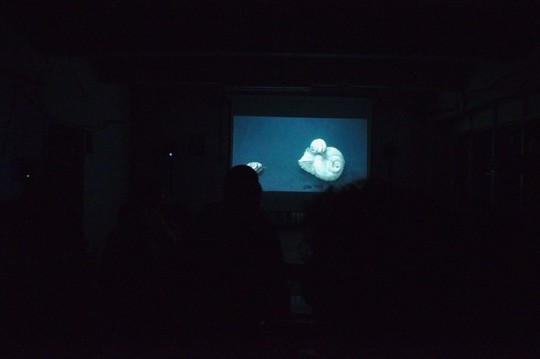

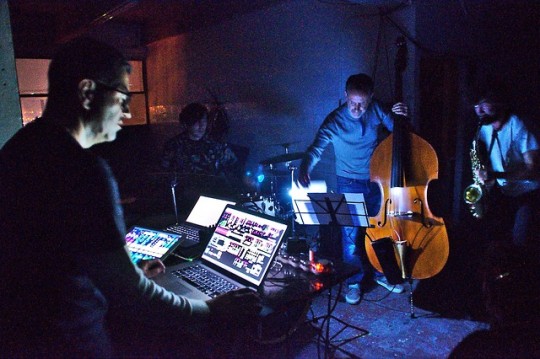
2019-04-13 / 13-04-2019
1> Nrrazti Ensemble 2> Amaia Molinet 3> Ferran Fages 4> M2R Electroacoustic Ensemble
Argazkiak / Fotos: Terri Florido
1 note
·
View note
Text
Ruido Vírico is an online festival broadcasting every weekend from Covid-19 Lockdown Spain. Sound artists, electronic musicians and videomakers from Spain and Portugal and elsewhere take part in a series of weekly events until the Lockdown lasts.


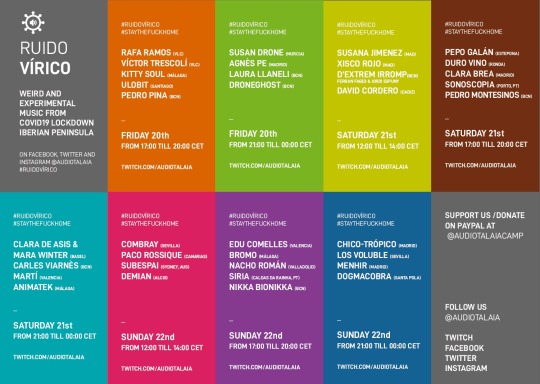
Arranca desde Valencia "Ruido Vírico" un festival de Música Electrónica por Streaming para sobrellevar el confinamiento
• El festival emitirá durante todo el fin de semana desde Valencia, Barcelona y Granada. • Esta iniciativa reúne a más de una treintena de artistas y músicos de España y Portugal. • El artista sonoro Edu Comelles afincado en Valencia es el encargado de este proyecto cultural.
Valencia. Lo que empezó como una broma entre amigos por whatsapp a terminado, después de una semana en un festival online en el que participan más de 30 artistas sonoros, músicos y DJs de toda la Península Ibérica.
La iniciativa ha sido impulsada por el artista sonoro afincado en Valencia Edu Comelles, con el apoyo de los activistas Jaume Muntsant y Javier Melgar, quienes a su vez, participan en el festival como músicos y DJs.
Toda la programación arranca este viernes 20 en el canal del festival dentro de la plataforma de streaming Twitch y amparado por el sello discográfico Audiotalaia. El festival se desarrollará a lo largo de todo el fin de semana presentando propuestas musicales alejadas de convencionalismos, música experimental, electrónica y arte sonoro.
Este proyecto comunitario, colectivo y autogestionado reúne propuestas que oscilan entre varios campos de la experimentación sonora y las músicas de vanguardia. A su vez el festival adoptando un carácter abiertamente ecléctico da cavida a propuestas que rozan el Folk, la música étnica, el ambient, el techno más abstracto o incluso el documental sonoro o la performance.
Elenco de artistas va desde el estallido audiovisual de los sevillanos Los Voluble pasando por la ambient íntimista y planeador de propuestas como las de David Cordero, Combray o Pepo Galán, pasando por la electrónica de vanguardia de artistas como Paloma Peñarubia, Clara Brea o la catalana Nikka Bionikka. El festival cuenta también con la presencia de músicos que se alejan de lo electrónico, tales como el brillante pianista catalán Carles Viarnés, la propuesta del colectivo Duro Vino, el planteamiento instrumental de músicos como Xisco Rojo o Síria el nuevo proyecto de la portuguesa Diana Combo.
La electrónica más escorada al baile más oscuro y intenso vendrá de la mano de propuestas como Droneghost cerrando la noche del viernes o el directo arrollador del alcoiano Demian Abraxas (We Are Not Brothers). A todo ello se suma el prestigio de la electrónica de Pedro Pina o la propuesta de electrónica preciosista de D'Extrem Irromp el más reciente proyecto del aclamado Ferran Fages,
El festival, de indudable raíz valenciana, completa el cartel con una buena representación de artistas de la Comunitat Valenciana, Martí Guillem, Víctor Trescolí el ya mencionado Demian Abraxas, Rafa Ramos o el mismo Edu Comelles son algunos de ellos.
En conjunto más de 20 horas de música en vivo a través de la pantalla del ordenador es la oferta de esta iniciativa que pretende hacer más llevadero el confinamiento pero a la vez quiere reivindicar la importancia de la cultura y las artes en la vida cotidiana y la necesidad de apoyar la labor de artistas y músicos. A tal efecto el festival ha habilitado la posibilidad de donar y contribuir a la inciciativa con aportaciones individuales en forma de micromecenazgo.
0 notes
Photo


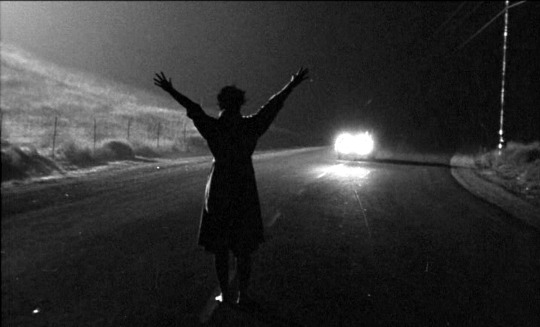

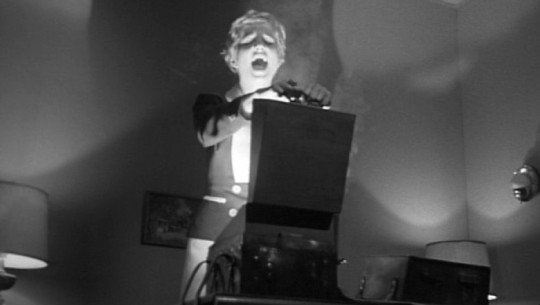

POST-SCRIPTUM 559
VA-VA VOUM
LA MORTE YOUNG sera aux festivals Bruitisme (à L’Embobineuse à Marseille) et Densités (près de Verdun), respectivement les 19 novembre et 22 octobre 2016. À Densités, le même jour : Xavier Garcia, Christine Abdelnour, Mika Vainio, Alfredo Costa-Monteiro, Ferran Fages, Olivier Toulemonde, Nicolas Desmarchelier. En attendant, voici nos deux flyers-maison...
#la morte young#talweg#sun stabbed#nappe#ferran fages#alfredo costa-monteiro#xavier garcia#pan sonic#mika vainio#christine abdelnour#olivier toulemonde#nicolas desmarchelier#bruitisme#densités#post-scriptum#merzbo derek#robert aldrich
9 notes
·
View notes
Text
Tomajazz: Suma#3 (Sala Fènix, 2016-03-22)
Tomajazz: Suma#3 (Sala Fènix, 2016-03-22)
martes 22 de marzo de 2016 | Sala Fènix (Barcelona) 1º Concierto: Joachim Badenhorst [clarinetes], Joan Antoni Pich [cello] y Àlex Reviriego [contrabajo] 2º Concierto: Fages-Prats [Ferran Fages, guitarra elèctrica i Ramon Prats, bateria] Todas las imágenes en Tomajazz.
View On WordPress
0 notes
Text
Tàlveg “The Art of Sweeping Things” (Sampler Sèries, L’Auditori, Sala 3-Tete Montoliu, Barcelona. 2022-01-21) Por Joan Cortès [INSTANTZZ AKA Galería fotográfica AKA Fotoblog de jazz, impro… y algo más]
Tàlveg “The Art of Sweeping Things” (Sampler Sèries, L’Auditori, Sala 3-Tete Montoliu, Barcelona. 2022-01-21) Por Joan Cortès [INSTANTZZ AKA Galería fotográfica AKA Fotoblog de jazz, impro… y algo más]
Sampler Sèries
Fecha: viernes, 21 de enero de 2022
Lugar: L’Auditori, Sala 3-Tete Montoliu (Barcelona)
Grupo:
Tàlveg
Marcel·lí Bayer, clarinete bajo y saxo barítono
Ferran Fages, guitarra
Oriol Roca, batería
Tomajazz: © Joan Cortès, 2022
Más información sobre…
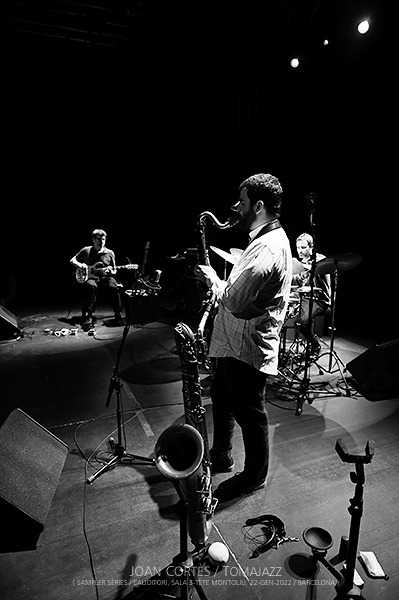
View On WordPress
#Ferran Fages#Joan Cortès#Marcel·lí Bayer#Oriol Roca#Sampler Sèries#Tàlveg#Tàlveg “The Art of Sweeping Things”
0 notes
Text
INSTANTZZ: Ferran Fages, Eric Bauer, Elena Vázquez & Miriam Reyes “Impro day 2 set 1” [MMI Festival -Music & More Impro- 2021 (V/VIII), Utopia 126, Barcelona. 2021-05-02] [Galería fotográfica AKA Fotoblog de jazz, impro… y algo más] Por Joan Cortès
INSTANTZZ: Ferran Fages, Eric Bauer, Elena Vázquez & Miriam Reyes “Impro day 2 set 1” [MMI Festival -Music & More Impro- 2021 (V/VIII), Utopia 126, Barcelona. 2021-05-02] [Galería fotográfica AKA Fotoblog de jazz, impro… y algo más] Por Joan Cortès
MMI Festival -Music & More Impro- 2021
Fecha: Domingo, 02 de mayo de 2021
Lugar: Utopia 126 (Barcelona)
Grupo:
Ferran Fages, Eric Bauer, Elena Vázquez & Miriam Reyes
Ferran Fages, guitarra
Eric Bauer, electrónica
Elena Vázquez, violín
Miriam Reyes, poesía
Tomajazz: © Joan Cortès, 2021
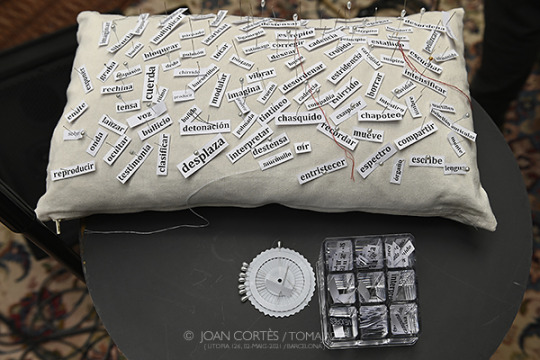
View On WordPress
#Elena Vázquez#Eric Bauer#Ferran Fages#Ferran Fages - Eric Bauer - Elena Vázquez - Miriam Reyes#Joan Cortès#Miriam Reyes#MMI -Music & More Impro-#MMI Festival
0 notes
Text
INSTANTZZ: Trobada (de 23) Improvisadors (23 Robadors, Barcelona. 2020-01-02) [Galería fotográfica]
INSTANTZZ: Trobada (de 23) Improvisadors (23 Robadors, Barcelona. 2020-01-02) [Galería fotográfica]
Por Joan Cortès.
Fecha: Jueves, 02 de enero de 2020
Lugar: 23 Robadors
Componentes:
Trobada (de 23) Improvisadors -formaciones por sorteo-
Trio-1
Marco Mezquida, piano
Pablo Vázquez, bajo
Ricardo Tejero, saxo alto
Quartet-1
Clara Lai, piano
Ferran Fages, guitarra
Jordi Pallarés, batería
El Pricto, electrónica
Trio-2
Celeste Alias, voz
Marcel·lí Bayer, saxo barítono
Fernando Carrasco, guitarra
Solo
Sòni…
View On WordPress
#Albert Cirera#Àlex Reviriego#Amidea Clotet#Celeste Alías#Clara Lai#Diana Palau#El Pricto#Fernando Carrasco#Ferran Fages#Iván González#Javier Garrabella#Joan Codina#Joan Cortès#Jordi Pallarés#Marcel·lí Bayer#Marco Mezquida#Maximilian Hering#Oriol Roca#Pablo Vázquez#Pol Padrós#Ramon Prats#Ricardo Tejero#Sònia Sánchez#Tom Chant
0 notes
Text
HDO 350. Albert Cirera, Memoria Uno, Phicus, Carrasco - Reviriego - González - Trilla: Spontaneous Music Tribune Series [Podcast]
El sello Multikulti Project ha lanzado la serie Spontaneous Music Tribune Series, que dedica sus cuatro últimas grabaciones a otras tantas propuestas provinientes de nuestro país, y más en concreto de la bullente escena de la libre improvisación de la Ciudad Condal. Albert Cirera (en solitario) con Lisboa’s Work; Memoria Uno de Iván González con Sons Of Liberty. Live At Granollersen una…
View On WordPress
#Agustí Fernández#Albert Cirera#Àlex Reviriego#Alfonso Muñoz#Christer Bothén#Fernando Carrasco#Ferran Fages#Iván González#Johannes Nästesjö#Julián Sánchez#Memoria Uno#Multikulti Project#Núria Andorra#Oriol Roca#Pablo Rega#Phicus#Pol Padrós#Ramón Prats#Sònia Sánchez#Spontaneous Music Tribune Series#Tom Chant#Vasco Trilla
0 notes
Link
Larunbateko (hilak 13) kontzertuaren aipamena Vericuetos irratsaioan, 28:40 minututik aurrera. m2R electroacustic ensemble eta Ferran Fagesen pieza bana entzun daitezke.
Mención del concierto del sábado 13 en el programa de radio Vericuetos, a partir del minuto 28:40. Se pueden escuchar piezas de m2R electroacustic ensemble y Ferran Fages
0 notes
Photo
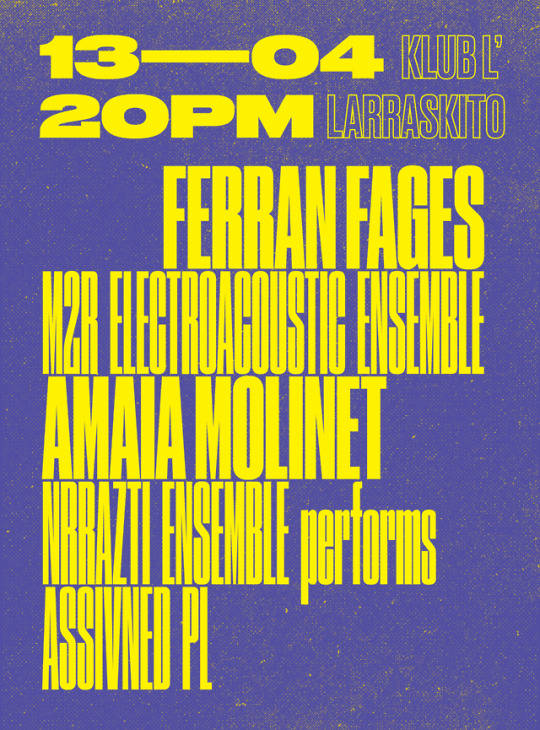
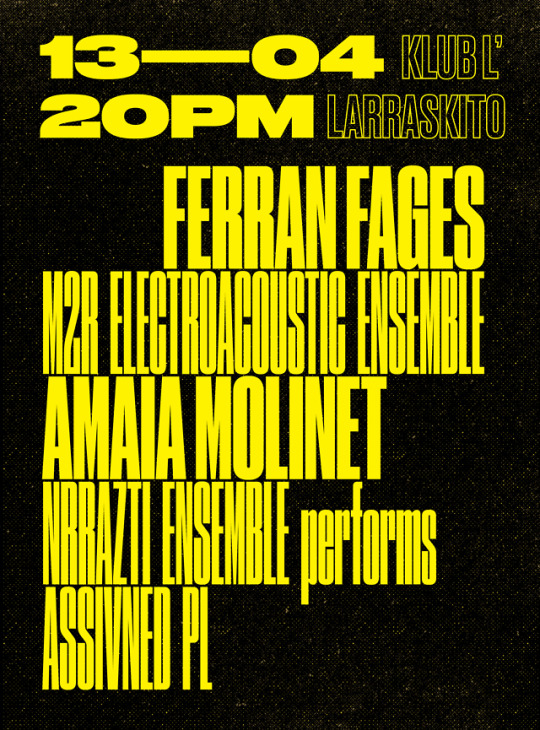
KLUB L´LELARRASKITO
2019KO
APIRILAREN 13a, LARUNBATA / SÁBADO 13 DE ABRIL
DE 2019
honakoekin / con
m2R ELECTROACOUSTIC ENSEMBLE
( tenerife , manolo rodriguez + carlos costa + pau torres + nasim lopez-palacios , electronica + contrabajo + saxo + bateria , contemporary jazz , www.manolo-rodriguez.bandcamp.com/album/the-wait )
+
FERRAN FAGES
( barcelona , guitarra , improvisación , www.ferranfages.net )
+
AMAIA MOLINET´S "FUTURE FOSSILS"
( lodosa , video + sonido de agnès pe , videoproyección , www.amaiamolinet.com )
+
NRRAZTI ENSEMBLE performs ASSIVNED pI
( bilbo & around , miguel a. garcía + ferran fages + garazi navas + ibon rg + nahia rojo + pau torres + fernando ulzion , electronics/composition + guitarra + acordeon/voz + guitarra + violin + saxo + saxo , outsider electroacoustics )
non? / será en
LUBK LE LARRRASKITO ( carretera errekalde-larraskitu errepidea 33, 4, bilbao )
20:00etan / A LAS 20:00
sarrera 5 € / entrada por 5€
Carlos Valverderen kartela / cartel por Carlos Valverde
____________________
m2R ELECTROACOUSTIC ENSEMBLE
m2R electroacustic ensemble Manolo Rodriguezek sortutako laukotea da, jazz estetika ezohiko bat proposatzen duena. Bertan, oinarrizko ezaugarriak dira konposizioaren eta inprobisazioaren arteko elkarreraginak eta elektronika-live codingaren eta instrumentu akustikoen elkarketa, proposamen oso garaikide eta freskoa emanez, New Yorkeko korronteetan duen inspirazioa ukatu gabe. Larraskiton "The Wait" lana aurkeztuko dute, eta elektronikaz arduratuko den Manolo beraz gainera, bertan izango dira: Carlos Costa, kontrabaxuarekin; Nasim Lopez-Palacio, bateriarekin; eta Pau Torres, saxo altuarekin.
m2R electroacoustic ensemble es un cuarteto formado por Manolo Rodriguez que propone una estética jazz muy poco habitual. En ella son aspectos base la interacción entre composición/improvisación y la unión entre electrónica-live coding con instrumentación acústica, configurando una propuesta musical muy actual y fresca, que no reniega de su inspiración en corrientes neoyorkinas. En Larraskito presentarán su trabajo discográfico “The Wait”, en esta formación con, además de Manolo a la electrónica, Carlos Costa al contrabajo, Nasim Lopez-Palacio a la bateria, y Pau Torres al saxo alto.
www.manolo-rodriguez.bandcamp.com/album/the-wait
FERRAN FAGES
Inprobisatzailea eta konpositorea da. Berrogeita hamar argitalpenetik gora egin ditu disketxe nazional eta nazioartekoetan. Birak, kontzertuak eta tailerrak egin ditu Europan, Amerikan eta Japonian. Gitarra, gailu elektroniko analogikoak eta disko-jogailu akustikoa jotzen ditu. Musikari esperimentatzailea da, eta instrumentu horiek tinbreen aldetik dituzten aukerak ikertuz, berreginez eta berdefinituz jo eta konposatzen du. Zenbat eta gutxiago, orduan eta gehiago denaren ideiari jarraituz, ikerketa lana egin du gitarrarekin, afinazio alternatiboak erabiliz eta batere efekturik gabe. Edergailurik gabeko soinu gordina, darabiltzan elementu eta baliabideekiko alderantziz proportzionala da.
Es improvisador y compositor. Ha publicado más de cincuenta referencias discográficas en sellos nacionales e internacionales. Ha hecho giras, conciertos y talleres por Europa, América y Japón. Toca guitarra, dispositivos electrónicos analógicos y giradiscos acústico. Músico experimentador explora, toca y compone reelaborando y redefiniendo las posibilidades tímbricas de los instrumentos con los cuales trabaja. Bajo la premisa menos es más, ha desarrollado un trabajo de investigación con la guitarra a partir del uso de afinaciones alternativas y la no utilización de efectos. Su sonido crudo y sin embellecimientos es inversamente proporcional a los elementos y recursos que emplea.
www.ferranfages.net
AMAIA MOLINET´S "FUTURE FOSSILS"
Kretazeoko barakuiluak ezkutatzen dira geure hirietako hainbat eraikuntza eta monumentutan, dinosauroen garaiko gastropodoen maskorrez betetako harriz eginda baitaude, duela 100 milioi urte ingurukoak.
Amaia Molinet (Lodosa, Nafarroa, 1988) Bilbon bizi da eta bertan lan egiten du. Arte Garaikide Teknologiko eta Performatiboa Master tituluduna da eta Arte Ederretan lizentziaduna, UPV/EHU-n.
Caracoles del cretácico se esconden en diversas construcciones y monumentos de nuestras ciudades, erigidos con rocas sedimentarias repletas de conchas de gasterópodos de la época de los dinosaurios, de hace aproximadamente 100 millones de años.
Amaia Molinet (Lodosa, Navarra, 1988) vive y trabajo en Bilbao. Es titulada Máster en Arte Contemporáneo, Tecnológico y Performativo y Licenciada en Bellas Artes por la UPV/EHU.
www.amaiamolinet.com
NRRAZTI ENSEMBLE performs ASSIVNED pI
"Miguel A. García & Ensemble" proiektuaren barruan egindako esperimentuetako batzuen luzapena da honakoa, MAG-ren elektronikak duen estetika berezia denbora errealean interpretatutako instrumentu akustikoekin nahastea bilatzen duena. Konposizio berri baterako proba honek (oraindik amaitu gabea) norabide berri bat ikertzen du, instrumentu akustikoei presentzia handiagoa emanez eta arraroki melodikoak diren digresioak eginaz, Garazi Navasen akordeoi eta ahotsaren gainean eraikiak. Beste musikari hauek ere osatzen dute Nrrazti izeneko Ensemble berri hau: Nahia Rojo (biolina), Ferran Fages eta Ibon RG (gitarrak), eta Pau Vila eta Fernando Ulzión (saxoak).
Prolongación de algunos experimentos del proyecto "Miguel A. García & Ensemble", que buscan mezclar la peculiar estética electrónica de MAG con instrumentación acústica interpretada en tiempo real. Esta prueba de una nueva composición (aún sin completar) explora una nueva dirección, con mas preponderancia de los instrumentos acústicos e incluso disgresiones extrañamente melodicas, construidas alrededor del acordeon y voz de Garazi Navas. Este nuevo ensemble (Nrrazti) lo completan el violín de Nahia Rojo, las guitarras de Ferran Fages e Ibon RG, y los saxos de Pau Vila y Fernando Ulzión.
https://youtu.be/B549206wWmk
0 notes
Text
INSTANTZZ: Patryk Zacrocki, ArturMajewski & Ingar Zach, Liudas Mockünas Trio y Ferran Fages (Can Balmes, MontMusic Festival 2019 -Les noves músiques al Montseny- Santa Maria de Palautordera -Barcelona-. 2018-10-19/20) [II] [Galería Fotográfica]
INSTANTZZ: Patryk Zacrocki, ArturMajewski & Ingar Zach, Liudas Mockünas Trio y Ferran Fages (Can Balmes, MontMusic Festival 2019 -Les noves músiques al Montseny- Santa Maria de Palautordera -Barcelona-. 2018-10-19/20) [II] [Galería Fotográfica]
Por Joan Cortès.
Fecha: Sábado, 19 de octubre de 2019
Lugar: Can Balmes (Santa Maria de Palautordera -Barcelona- )
Grupo:
Patryk Zacrocki, Artur Majewski & Ingar Zach
Patryk Zacrocki, viola
Artur Majewski, trompeta
Ingar Zach, percusión
Liudas Mockünas Trio
Liudas Mockünas, saxo soprano, saxo tenor y clarinete
Arnas Milkalkenas, batería
Häkon Berre, batería
Fecha: Domingo, 20 de octubre de 2019
L…
View On WordPress
#Arnas Milkalkenas#Artur Majewski#Faerran Fages#Håkon Berre#Ingar Zach#Joan Cortès#Liudas Mockunas#Liudas Mockünas Trio#Patryk Zacrocki#Patryk Zacrocki - Artur Majewski - Ingar Zach
0 notes